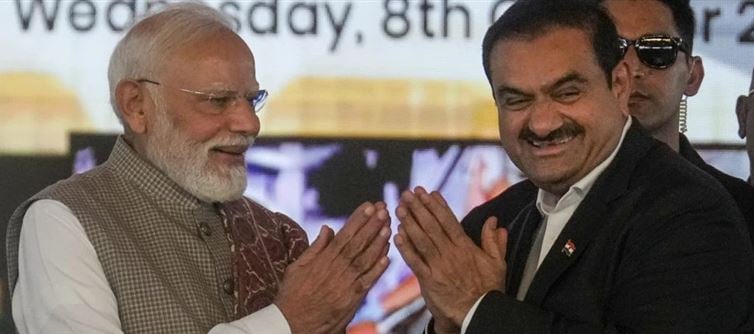
WHEN TAXPAYER MONEY BECOMES A PRIVATE LIFELINE
In a move that reads like a political thriller with billions at stake, the Modi government quietly orchestrated a $3.9 billion rescue plan for gautam Adani’s debt-laden conglomerate. Major foreign banks reportedly hesitated to fund adani amid allegations of stock manipulation, fraud, and US DOJ investigations. Enter LIC, India’s state-owned life insurance behemoth, holding millions of citizens’ savings — including low-income families — to underwrite the rescue.
Documents obtained by the Washington Post reveal a coordinated plan between the Finance Ministry, DFS, lic, and NITI Aayog, funneling public money into adani bonds and equity — sparking fierce debate over political favoritism, financial prudence, and risk to ordinary Indians.
1. THE BAILOUT BLUEPRINT: lic AS ADANI’S BANK
In May 2025, lic financed a $585-million bond issue for adani Ports, becoming the sole investor.
The stated aim: “signaling confidence” to attract other investors. Critics call it a blatant misuse of public funds: a private billionaire rescued with the life savings of ordinary Indians.
Analysts warned that lic was taking abnormal risks by backing a politically connected conglomerate already under global scrutiny. Hemindra Hazari noted, “If anything happens to LIC… It’s only the government that can bail it out.”
In short, risk shifted from billionaire to taxpayer.
2. POLITICAL FAVORITISM OR NATIONAL STRATEGY?
Documents portray adani as a “visionary entrepreneur”, critical to India’s national economic goals.
Yet questions remain:
Why is lic, tasked with safeguarding citizens’ savings, financing a private group amid corruption allegations?
Does this represent the deepening corporate-state nexus, where fortunes mirror government ambitions?
Opposition voices are uncompromising. TMC mp Mahua Moitra tweeted:
"All patriots & media houses — how about coverage on ₹30,000 crores of taxpayer money used as Adani’s piggybank courtesy @FinMinIndia?"
Critics see political favoritism, while adani maintains its rise predates Modi’s leadership and denies any influence.
3. GLOBAL SCRUTINY AND DOMESTIC CONSEQUENCES
The adani Group is under US DOJ and SEC investigations, accused of bribery, fraud, and illegal payments totaling $250 million.
Meanwhile, foreign banks declined involvement, highlighting the risk. LIC’s intervention shifts financial exposure to indian policyholders, raising the stakes for ordinary citizens who had no say in this billion-dollar gamble.
SEBI investigations dismissed two Hindenburg allegations, but international scrutiny persists.
Adani’s opaque finances and political ties make public oversight critical, yet transparency is lacking.
4. media AND WHISTLEBLOWERS UNDER FIRE
Independent journalists covering the bailout, like Ravi Nair, face defamation lawsuits from adani Group, chilling investigative reporting.
A democratic society relies on scrutiny of public funds.
When whistleblowers and journalists are silenced, corporate-state entanglement thrives unchecked.
5. THE RISK TO indians AND TAXPAYERS
lic insures millions, including low-income households. By diverting funds to rescue a billionaire under investigation, the government places ordinary citizens’ savings at risk.
Bondholders’ losses are socialized, while profits are privatized.
The bailout is a stark reminder that political patronage can supersede fiscal prudence.
Analysts warn: if adani falters, lic and its policyholders bear the fallout. The government, again, becomes the safety net for the ultra-rich.
CLOSING: BILLIONS, BAILOUTS, AND BROKEN TRUST
The Adani-LIC episode exposes a dangerous nexus of politics, business, and public funds.
It’s a story of billions maneuvered quietly, ordinary citizens left risk-exposed, and the media and opposition struggling to hold power accountable.
In a democracy, taxpayer money is sacred. When it becomes a bailout for a billionaire ally, trust is eroded, accountability is questioned, and ordinary indians are left to wonder: who truly protects the public?




 click and follow Indiaherald WhatsApp channel
click and follow Indiaherald WhatsApp channel